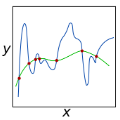The use of Implicit Neural Representation (INR) through a hash-table has demonstrated impressive effectiveness and efficiency in characterizing intricate signals. However, current state-of-the-art methods exhibit insufficient regularization, often yielding unreliable and noisy results during interpolations. We find that this issue stems from broken gradient flow between input coordinates and indexed hash-keys, where the chain rule attempts to model discrete hash-keys, rather than the continuous coordinates. To tackle this concern, we introduce RHINO, in which a continuous analytical function is incorporated to facilitate regularization by connecting the input coordinate and the network additionally without modifying the architecture of current hash-based INRs. This connection ensures a seamless backpropagation of gradients from the network's output back to the input coordinates, thereby enhancing regularization. Our experimental results not only showcase the broadened regularization capability across different hash-based INRs like DINER and Instant NGP, but also across a variety of tasks such as image fitting, representation of signed distance functions, and optimization of 5D static / 6D dynamic neural radiance fields. Notably, RHINO outperforms current state-of-the-art techniques in both quality and speed, affirming its superiority.
翻译:暂无翻译




